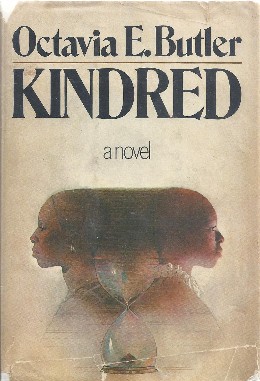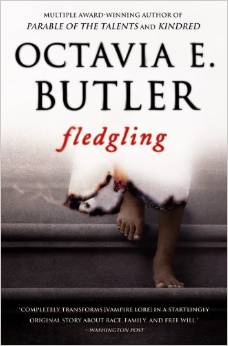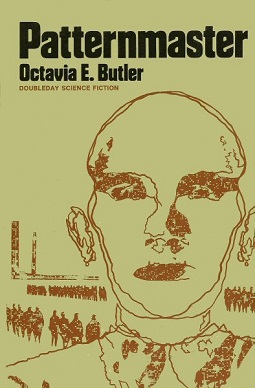Survivor(s) may refer to:

Octavia Estelle Butler was an American science fiction author and a multiple recipient of the Hugo and Nebula awards. In 1995, Butler became the first science-fiction writer to receive a MacArthur Fellowship.
The Carl Brandon Society is a group originating within the science fiction community. Their mission "is to increase racial and ethnic diversity in the production of and audience for speculative fiction." Their vision is "a world in which speculative fiction, about complex and diverse cultures from writers of all backgrounds, is used to understand the present and model possible futures; and where people of color are full citizens in the community of imagination and progress."

Parable of the Sower is a 1993 speculative fiction novel by American writer Octavia E. Butler. It is set in a post-apocalyptic Earth heavily affected by climate change and social inequality. The novel follows Lauren Olamina, a young woman who can feel the pain of others and becomes displaced from her home. Several characters from various walks of life join her on her journey north and learn of a religion she has discovered and titled Earthseed. The main tenets of Earthseed are that "God is Change" and believers can "shape God" through conscious effort to influence the changes around them. Earthseed also teaches that it is humanity's destiny to inhabit other planets and spread the "seeds" of the Earth.

Parable of the Talents is a science fiction novel by the American writer Octavia E. Butler, published in 1998. It is the second in a series of two, a sequel to Parable of the Sower. It won the Nebula Award for Best Novel.

Lilith's Brood is a collection of three works by Octavia E. Butler. The three volumes of this science fiction series were previously collected in the now out-of-print omnibus edition Xenogenesis. The collection was first published under the current title of Lilith's Brood in 2000.

Kindred (1979) is a novel by American writer Octavia E. Butler that incorporates time travel and is modeled on slave narratives. Widely popular, it has frequently been chosen as a text by community-wide reading programs and book organizations, and for high school and college courses.

Fledgling is a science fiction vampire novel by American writer Octavia E. Butler, published in 2005.

Survivor is a science fiction novel by American writer Octavia E. Butler. First published in 1978 as part of Butler's "Patternist series", Survivor is the only one of Butler's early novels not to be reprinted after its initial editions. Butler expressed dislike for the work, referring to it as "my Star Trek novel."

Black science fiction or black speculative fiction is an umbrella term that covers a variety of activities within the science fiction, fantasy, and horror genres where people of the African diaspora take part or are depicted. Some of its defining characteristics include a critique of the social structures leading to black oppression paired with an investment in social change. Black science fiction is "fed by technology but not led by it." This means that black science fiction often explores with human engagement with technology instead of technology as an innate good.
Dark Matter is an anthology series of science fiction, fantasy, and horror stories and essays produced by people of African descent. The editor of the series is Sheree Thomas. The first book in the series, Dark Matter: A Century of Speculative Fiction from the African Diaspora (2000), won the 2001 World Fantasy Award for Best Anthology. The second book in the Dark Matter series, Dark Matter: Reading the Bones (2004), won the World Fantasy Award for Best Anthology in 2005. A forthcoming third book in the series is tentatively named Dark Matter: Africa Rising. This was finally published at the end of 2022 under the title Africa Risen: A New Era of Speculative Fiction, from Tor Books.

Wild Seed is a science fiction novel by American writer Octavia Butler. Although published in 1980 as the fourth book of the Patternist series, it is the earliest book in the chronology of the Patternist world. The other books in the series are, in order within the Patternist chronology: Mind of My Mind (1977), Clay's Ark (1984), Survivor (1978), and Patternmaster (1976).

Bloodchild and Other Stories is the only collection of science fiction stories and essays written by American writer Octavia E. Butler. Each story and essay features an afterword by Butler. "Bloodchild", the title story, won the Hugo Award and Nebula Award.
"The Evening and the Morning and the Night" is a science fiction novelette by American writer Octavia Butler. It was first published in Omni in May 1987, and subsequently republished in The Year's Best Science Fiction ; in Best New SF 2; in Omni Visions One; in The Penguin Book of Modern Fantasy By Women; in Dark Matter: A Century of Speculative Fiction from the African Diaspora; in Daughters of Earth: Feminist Science Fiction in the Twentieth Century; in Crucified Dreams; in Butler's collection Bloodchild and Other Stories, and as a chapbook from Pulphouse Publishing.

Mind of My Mind (1977) is a science fiction novel by American writer Octavia E. Butler. Mind of My Mind is the prequel to Butler's novel Patternmaster, and is the second novel in the Patternist series.

Patternmaster (1976) is a science fiction novel by American author Octavia E. Butler. Patternmaster, the first book to be published but the last in the series' internal chronology, depicts a distant future where the human race has been sharply divided into the dominant Patternists, their enemies the "diseased" and animalistic Clayarks, and the enslaved human mutes. The Patternists, bred for intelligence and psychic abilities, are networked telepaths. They are ruled by the most powerful telepath, known as the Patternmaster. Patternmaster tells the coming-of-age story of Teray, a young Patternist who learns he is a son of the Patternmaster. Teray fights for position within Patternist society and eventually for the role of Patternmaster.

Clay's Ark (1984) is a novel by American science fiction author Octavia E. Butler. The last published of her Patternist series, the novel serves as a prequel that accounts for the arrival of the Clay Ark disease that leads to the evolution of clayarks, the mutants that threaten human survival in the series debut novel, 1976's Patternmaster, and 1978's Survivor, which Butler later disavowed.
Symbiosis (mutualism) appears in fiction, especially science fiction, as a plot device. It is distinguished from parasitism in fiction, a similar theme, by the mutual benefit to the organisms involved, whereas the parasite inflicts harm on its host.

Octavia E. Butler Landing is the February 18, 2021, landing site of the Mars 2020 Perseverance rover within Jezero crater on planet Mars. On March 5, 2021, NASA named the site for the renowned American science fiction author, Octavia E. Butler, who died on February 24, 2006. The Mars landing took place nearly 15 years to the day after her death. The coordinates of the landing site on Mars are 18.44°N 77.45°E

Unexpected Stories is a collection of two short speculative fiction works by Octavia Butler that was posthumously published in 2014. The collection includes A Necessary Being and Childfinder.















